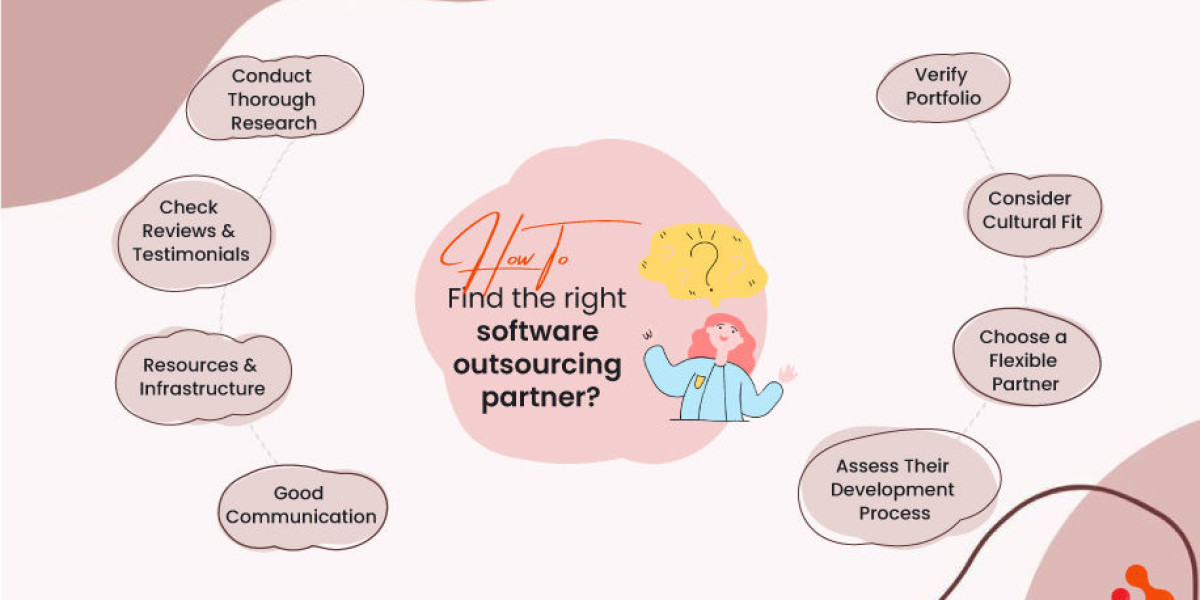Introduction
In today's tech-driven world, many businesses outsource IT to streamline operations. Choosing the right outsourcing partner is crucial for success. This blog explores the rising trend of IT outsourcing, highlighting the significance of a strategic partnership. We'll delve into essential factors to consider, making it easy for everyone to understand how to navigate the decision-making process effectively. Whether you're a small startup or a large enterprise, finding the perfect IT outsourcing match can significantly impact your business.
Understanding Your Business Needs
In the world of IT outsourcing, it's crucial to align your business needs with the right partner. Here's a simplified guide to help you get started:
Conducting a Comprehensive Assessment of Your IT Requirements
- List Your Current IT Setup: Identify your existing IT infrastructure, software, and hardware.
- Evaluate Performance: Assess the efficiency and effectiveness of your current IT systems.
- Identify Pain Points: Pinpoint specific challenges or gaps in your IT setup.
Identifying Specific Goals and Objectives for Outsourcing
- Define Clear Objectives: Clearly state what you aim to achieve through outsourcing.
- Prioritize Goals: Identify primary and secondary goals for the outsourcing partnership.
- Quantify Success: Set measurable targets to gauge the success of the outsourcing project.
Determining the Scope and Scale of the Outsourcing Project
- Define Project Scope: Clearly outline the tasks and responsibilities you want to outsource.
- Consider Future Growth: Anticipate potential changes in your business that impact IT needs.
- Assess Resource Requirements: Determine the support and resources required for the project.
These steps lay a strong foundation for selecting an outsourcing partner that meets your current needs and aligns with your future business goals.
Researching Potential Partners
Creating a List of Potential IT Outsourcing Partners
- Start by identifying potential IT outsourcing partners through online research and referrals.
- Compile a list of companies that match your business needs and goals.
Evaluating Reputation and Credibility
- Look for reviews and ratings on independent platforms such as Clutch or Glassdoor.
- Check the partner's website for client testimonials and success stories.
- Evaluate the partner's reputation within the industry and their standing in the developer community.
Analyzing Client Testimonials and Case Studies
- Dive into client testimonials to understand firsthand experiences with the outsourcing partner.
- Examine case studies that showcase successful projects and solutions provided by the partner.
- Please consider how well the partner has addressed challenges and delivered value to their clients.
By following these steps, you can ensure a thorough assessment of potential IT outsourcing partners, helping you make an informed decision when hiring developers or remote development teams.
Assessing Technical Expertise
In hire developers or remote developers, ensuring your potential partners have the technical know-how to do the job is crucial. Here are some critical steps:
Reviewing Technical Skills
- Look at the skills your potential partners bring to the table. Are they fluent in the programming languages and technologies your project needs?
- Check for hands-on experience in similar projects. Practical know-how is often as necessary as theoretical knowledge.
Certifications and Recognition
- Check if your potential partners have relevant certifications. These are like badges of honor that show they have expertise in specific areas.
- Look for industry recognition. Awards or positive mentions from reputable sources can be a good sign of their capabilities.
Alignment with Your Technology Stack
- Your tech stack is like the foundation of a house – it needs to be solid and compatible. Ensure that your potential partners are well-versed with your specific technology requirements.
- Discuss your tech preferences openly. It's about more than what they know but how well it aligns with your needs.
Remember, the goal here is to hire developers and the right ones who can seamlessly integrate into your project. Taking the time to assess their technical expertise ensures a smoother collaboration and a better chance of success in your endeavors to hire remote developers.
Evaluating Experience and Industry Knowledge
When hiring developers or remote developers for your project, ensuring that the outsourcing partner has the right experience and industry knowledge is crucial. Here's a simple breakdown:
Assessing Industry Experience
- Check if the outsourcing partner has worked in your specific industry.
- Look for familiarity with the challenges and opportunities unique to your business domain.
- Experience in your industry means they're more likely to understand your needs and provide tailored solutions.
Reviewing Past Projects and Success Stories
- Dive into the outsourcing partner's portfolio.
- Look for projects similar to yours to gauge their expertise.
- Success stories demonstrate their ability to deliver quality work and meet client expectations.
Verifying Understanding of Regulations and Compliance
- Ensure the outsourcing partner is aware of and adheres to industry regulations.
- Confirm their understanding of compliance standards relevant to your business.
- This is especially important for sensitive projects with significant data security and legal requirements.
By focusing on these points, you're not just hiring developers but securing a partner with a proven track record in your industry. This ensures a smoother collaboration and higher chances of project success.
Scalability and Flexibility
In the ever-evolving landscape of business and technology, hiring developers or remote developers who meet your current needs and grow with your business is crucial. Here are some key points to consider:
Ensuring the partner can scale services as your business grows
- Look for a partner with a proven track record of handling increased workloads.
- Check if they have a pool of skilled developers to accommodate expansion.
- Discuss their strategies for seamlessly integrating additional resources when needed.
Assessing flexibility to adapt to changing business requirements
- Choose a partner that can pivot with your changing business priorities.
- Verify if they are open to adopting new technologies and methodologies.
- Discuss how quickly they can adjust to shifts in project scope or objectives.
Discussing potential challenges and solutions for scalability
- Have an open conversation about potential obstacles in scaling operations.
- Understand their contingency plans for unforeseen challenges.
- Explore how they handle recruitment and onboarding of new team members.
Hire remote developers is about more than meeting your current needs. It's about finding a partner who can adapt and grow alongside your business, providing the flexibility needed to navigate the dynamic landscape of the tech industry.
Communication and Collaboration
Effective communication and collaboration are vital for success in hiring developers or remote developers. Let's break down the critical points in an easy-to-understand manner:
Evaluating Communication Channels and Responsiveness
- Look for partners with transparent and efficient communication channels.
- Opt for platforms that suit both parties, ensuring everyone is on the same page.
- Prioritize responsiveness – timely communication is crucial in remote collaborations.
Ensuring Cultural Compatibility and Language Proficiency
- Seek partners with a cultural understanding or similar work ethos.
- Confirm language proficiency to avoid misunderstandings or language barriers.
- A shared cultural background can enhance collaboration and teamwork.
Assessing Collaboration Tools and Project Management Methodologies
- Explore the collaboration tools used by potential partners.
- Ensure compatibility with your team's preferred means for seamless integration.
- Assess project management methodologies – Agile, Scrum, etc., to align with your workflow.
Why Does This Matter When You Hire Developers or Remote Developers?
- Efficient communication ensures smooth project progress and problem-solving.
- Cultural compatibility fosters a positive working environment and enhances creativity.
- Standard tools and methodologies streamline collaboration and project management.
Tips for Hiring Developers:
- Prioritize developers with good communication skills.
- Choose remote developers who understand and respect diverse cultures.
- Opt for those familiar with collaboration tools like Slack Zoom or project management methodologies like Agile.
When hiring developers or remote developers, emphasize effective communication, cultural understanding, and aligned collaboration tools to build a solid and successful partnership.
Data Security and Compliance
Ensuring the safety of your business data is crucial, especially when you hire developers or remote developers. Here's a simplified guide on how to approach data security and compliance:
Prioritizing Data Security Measures
- Encryption is Key:
- Ensure that your data is encrypted, making it unreadable for unauthorized access.
- Look for a partner who emphasizes strong encryption practices for both data in transit and at rest.
- Access Control:
- Implement robust access control measures to restrict data access based on roles and responsibilities.
- Ensure the IT outsourcing partner follows the principle of least privilege, granting only the necessary permissions.
- Regular Security Audits:
- Schedule regular security audits to identify and rectify vulnerabilities.
- Choose a partner who conducts periodic security assessments to stay ahead of potential threats.
Verifying Compliance with Industry Regulations and Standards
- Understand Industry Requirements:
- Research and understand the specific data protection regulations and standards relevant to your industry.
- Ensure your IT outsourcing partner is well-versed in and compliant with these regulations.
- Certifications Matter:
- Look for certifications such as ISO 27001, demonstrating a commitment to information security management.
- Confirm that the outsourcing partner's practices align with industry-recognized standards.
- Ask for Documentation:
- Request documentation that illustrates the partner's compliance efforts, such as policies, procedures, and audit reports.
- Choose a transparent partner willing to provide evidence of adherence to regulations.
Discussing Confidentiality Agreements and Data Protection Policies
- Draft Clear Confidentiality Agreements:
- Work with legal experts to create clear and comprehensive confidentiality agreements.
- Ensure that these agreements explicitly define the handling and protection of sensitive information.
- Review Data Protection Policies:
- Carefully review the outsourcing partner's data protection policies.
- Discuss and clarify aspects that must be fully understood to avoid misunderstandings later.
- Communication is Key:
- Foster open communication about data protection expectations.
- Discuss how your data will be handled, stored, and protected throughout development.
Remember, when you hire developers or remote developers, prioritizing data security is not just about compliance; it's a fundamental aspect of building trust and ensuring the success of your collaboration.
Cost and Budget Considerations When Hiring Remote Developers
In hiring developers and remote talent, getting a grip on the financial aspects is crucial. Here's a breakdown in simple terms:
Understanding Pricing Models
- Hourly Rates: Determine if the pricing is based on hours worked. It's common for remote developers to charge per hour.
- Project-based Pricing: Some prefer a fixed cost for the entire project. Understand if this aligns with your needs.
- Monthly Retainers: Explore if a monthly retainer model suits your ongoing development requirements.
Clarifying Additional Costs and Hidden Fees
- Communication Tools: Check if costs associated with communication tools (like Slack Zoom) are included or additional.
- Software Licenses: Ensure clarity on who covers the costs of any required software licenses.
- Overtime Charges: Understand the policy on overtime work and any other charges.
Creating a Comprehensive Budget
- Define Scope Clearly: Outline what's included in the Scope of work to avoid unexpected costs.
- Factor in Contingencies: Allow room for unforeseen circumstances or scope changes.
- Align with Financial Goals: Ensure the budget aligns with your financial goals and project outcomes.
Remember, a well-defined budget keeps your finances in check and sets the stage for a transparent and successful partnership when hiring remote developers.
Contract Negotiation and Legal Considerations
Outlining Terms and Conditions in the Outsourcing Contract
- Clearly define the Scope of work: Outline what services the outsourcing partner will provide.
- Specify deliverables: Clearly state the expected outcomes and timelines for each deliverable.
- Define responsibilities: Clarify the roles and responsibilities of both parties to avoid misunderstandings.
Clarifying Service Level Agreements (SLAs) and Performance Metrics
- Establish measurable metrics: Define specific performance indicators the outsourcing partner must meet.
- Set expectations for response times: Clearly state how quickly the partner should respond to issues or requests.
- Outline consequences for non-compliance: Specify what happens if the outsourcing partner fails to meet agreed-upon SLAs.
Seeking Legal Advice to Ensure a Fair and Comprehensive Agreement
- Consult with legal professionals: Engage lawyers experienced in outsourcing contracts to review and provide input.
- Address potential risks: Identify and mitigate risks by having legal experts review contractual terms.
- Ensure compliance with regulations: Verify that the outsourcing agreement adheres to relevant industry regulations and legal standards.
Remember, a well-drafted contract is crucial for a successful outsourcing partnership. It protects both parties, sets clear expectations, and provides a foundation for a positive long-term collaboration.
Building a Long-Term Partnership with Acquaint Softech
Building a solid and lasting partnership with your IT outsourcing provider, like Acquaint Softech, is crucial for the success of your projects. Here's a straightforward guide on how to achieve that:
Clear Communication Channels for Ongoing Collaboration
- Set up regular meetings: Schedule consistent check-ins to discuss ongoing projects and address any concerns.
- Utilize communication tools: Leverage platforms like email, chat, and video conferencing for seamless communication.
- Define points of contact: Identify key contacts on both sides to ensure smooth and efficient communication.
Discussing the Potential for Future Projects and Expansions
- Strategic planning: Talk about your long-term business goals and how Acquaint Softech can support them.
- Scalability discussions: Explore the potential for expanding the partnership as your business grows.
- Aligning visions: Ensure that both parties share a common vision for the future of the collaboration.
Planning for Periodic Performance Reviews and Feedback Sessions
- Regular performance evaluations: Schedule periodic reviews to assess the quality of work and adherence to deadlines.
- Open feedback sessions: Encourage open and honest feedback from both sides to address any issues promptly.
- Continuous improvement: Work together to implement improvements based on feedback, ensuring a dynamic and evolving partnership.
Following these simple steps, you can cultivate a long-term partnership with Acquaint Softech, fostering collaboration, innovation, and success in your IT outsourcing endeavors.
Conclusion
In conclusion, selecting the perfect IT outsourcing partner requires careful thought and planning. Consider your business needs, research potential partners, and assess their technical expertise and experience. Prioritize effective communication and collaboration, which are vital for a successful partnership. Remember, a strategic and thorough selection process is crucial. By emphasizing these factors, you pave the way for a fruitful and enduring collaboration with your IT outsourcing partner. Stay connected, communicate openly, and build a relationship that fosters growth and success for your business.














